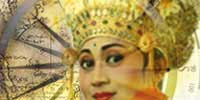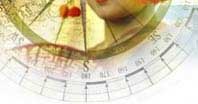|
Long before Sun Microsystems invented Java, it already
existed. If you haven't guessed already, the island of Java
since long ago, produces excellent coffee beans. Coffee
connoisseurs from all over the world are invited to taste
the "Kopi Tubruk" or, for the select few among you, "Kopi
Luwak" (email us if you
are truly interested in what the fuss is all about with
Kopi Luwak).
The people of Java are interpretive, or so they say. If
we may make a generalization, they are quiet, polite, and
reserved. There are several ethnicities native to Java,
from the Betawi people on the Western end of the island,
to the Sunda people in the center of West Java, the Javanese,
spread all over the island, and the Maduranese in the island
of Madura off the coast of Surabaya.
Geopolitically, the island is divided into five states:
As you can see from the penetration of Starbucks and company
in the U.S., Java is Culture. How many places on this planet
can claim ancestry all the way to the Pithecantropus Erectus,
discovered by Dubois in Trinil,
a small village near Ngawi in East Java ? And Mr. P.E.
was not alone; the island of Java is remarkably rich in
fossil remains of homo erectus, the ancestors of modern
mankind believed to roam the island around 1.6 million to
250 thousand years ago. Some 20 different individuals have
been discovered in Solo and Mojokerto.
If we fast forward several hundred thousand years, Javanese
kingdoms can be dated as far back to the 4th century AD.
The Srivijaya Empire, the first kingdom to rule most of
modern Indonesia today, also ruled most of Java circa 800.
The Majapahit Empire followed around the 13th to the 16th
centuries to be the unifying kingdom of Java. These two
empires, as well as dozens of other little kingdoms in Java,
and interacting with the many waves of external influences
coming from religious and trader cultures from Persia, China,
and Europe, have left legacies of deep culture and tradition
in Java and its people. The magnicifent temples of the Prambanan
or Borobudur are two tokens of this rich historical background.
Modern Javanese culture is equally rich, with much of
the tradition still practiced. The music of gamelan orchestra,
solemnly accompanying the gracefulness of the dancers or
furiously depicting the fiery fights of Pandawa in Mahabrata
are all testament to the fabric of cultural wealth that
comprises Java today.
|






